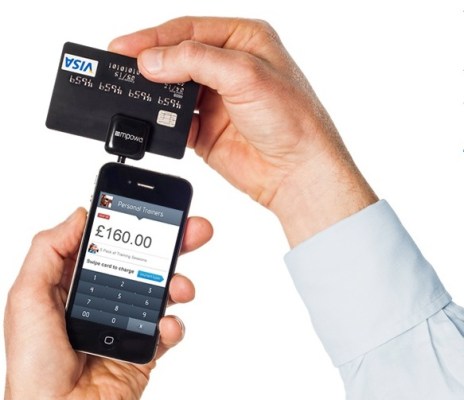Square is gearing up to launch its first international services by the end of this year, but in the meantime, one of its many dongle-based mobile payment competitors is building up outside of the U.S. Today mPowa — who you may recall from “hand-gate” — announced that it has signed a white-label deal with First National Bank in South Africa to offer its payment device in the country. The exact financial terms of the deal were not revealed but mPowa says its value is in the “multimillion pound” range. This is the first announced deal for UK-based mPowa, which is building its multiplatform (Android, iOS iPhone and iPad devices, Windows Phone and BlackBerry) mobile payments service both as a retail and wholesale/white-label offering.
Under the terms of the deal, FNB will integrate mPowa’s hardware and software into its existing merchant services, with FNB’s own branding and look. mPowa’s founder and CEO Dan Wagner tells TechCrunch that it is also working with several other financial institutions for similar products in Europe, the U.S., and Asia, as well as other markets in Africa.
As with Square, iZettle, PayPal’s Here, Rocket Internet’s Payleven, and many more, mPowa has built a system that lets merchants download an app to a smartphone or tablet, and then plug in a dongle into a device that then lets them take payments for goods and services via their handsets or tablets; there is also a Bluetooth connection option. As with the other solutions, one big target market is the group of smaller merchants that currently do not accept card payments.
mPowa’s twist on that is that it is also working with banks to extend the ability to take payments with mobile devices for those who do take payments already. This means that, for example, delivery people or others that roam away from a central point of sale can also be equipped with instant card readers.
This latter category is especially interesting to bigger businesses — and banks, of course — because it means targeting much larger businesses processing a much higher volume of transactions. A solution like this also gives the banks one more bell/whistle with which to woo merchants away from other payment providers. Wagner noted that the FNB deal will be rolled out to “thousands of their business customers.”
The white-label move, if companies bite, could see services like Square’s become even more mainstream. Up to now, Square’s biggest corporate deal by far, with Starbucks, has put its branding firmly into the center of the equation: the two will use Pay With Square to enable payments at Starbucks’ coffee shops in the U.S. and eventually worldwide.
It will be interesting to see if Square also looks at the white-label, non-branded route as a way to also grow, as mPowa is doing: “This deal validates our white label strategy, which in itself is a vital part of how we plan to take hold of the global mobile payment market,” said Wagner in a statement. “We have aggressive growth plans and are looking to rapidly increase take-up of our service as more companies capitalise on the business benefits that mPowa delivers.”
